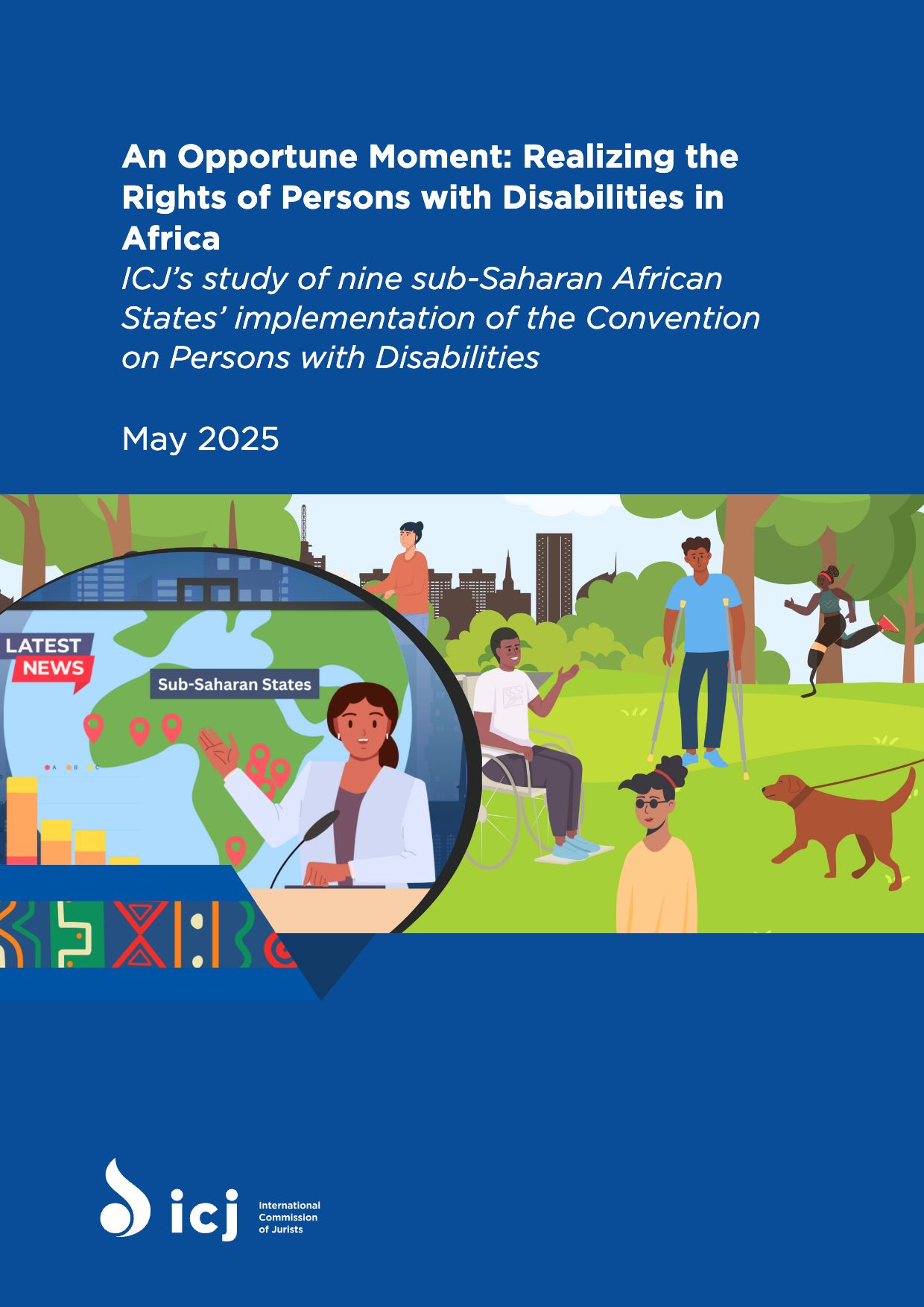The International Commission Jurists (ICJ) has issued a report finding that while African authorities in the region have incorporated an improved discourse around disability rights to introduce or explain policy and law, these narratives are far too often not met with changes in law, policy or and practices that are compliant with States’ legal obligations and the needs of persons with disabilities.
The report, entitled An Opportune moment: the enforcement of disability rights in the African context and launched on 15 May in Nairobi, evaluates the performance of nine sub-Saharan African States (Ghana, Nigeria, Sierra Leone, Kenya, Rwanda, Uganda, Malawi, South Africa, and Zimbabwe) in their implementation of the UN Convention on the Rights of Persons with Disabilities (CRPD).
The report comes at a time when a new regional Africa, the Africa Disability Protocol, has just come and force.
The ICJ stresses that this gap between official commitments and rhetoric and reality in practice means that there has been a very limited impact on the lives of persons with disabilities, their well-being and their full enjoyment of human rights on an equal basis with others.
“The findings in the report should go a long way in strengthening advocacy efforts by organizations of persons with disabilities and other stakeholders, both at the country level before regional mechanisms such as the African Commission on Human and Peoples’ Rights,” said Wilson Macharia, ICJ Legal Adviser.
“The ICJ remains committed to facilitating engagements with the Commission and supporting organizations of persons with disabilities in drafting alternative reports using these findings”, Macharia added.
The report, which is the first of its kind, serves as a valuable tool for stakeholders to assess the progress made in realizing the rights of persons with disabilities in the countries examined, with the aim of supporting continued advancement towards the full realization of the rights of persons with disabilities.
“The recently enacted Persons with Disabilities Acts of Malawi and Kenya respectively are contemporary examples of how international disability rights standards may be made appropriately operational through domestic legislation”, said Lawrence Mute, an independent consultant for the ICJ who led the elaboration of the report.
Although the report focuses on nine States, the ICJ’s recommendations are of more general application in the broader African context. They are made to all stakeholders, including State authorities, organizations of persons with disabilities and other civil society organizations.
The ICJ recommends that the African Commission on Human and People’s Rights play an increased and robust role in advancing the rights of persons with disabilities. In that regard, the ICJ has welcomed the adoption by the Commission, its 81st Ordinary Session in November 2024, a Resolution on the Entry into Force and Implementation of the Protocols on the Rights of Older Persons and Persons with Disabilities in Africa.
In addition to these broad recommendations, the ICJ’s report presents findings and makes specific recommendations to State authorities, justice actors, regional bodies, and civil society across the seven specific areas:
- Legal capacity;
- Liberty of person;
- Access to justice;
- Political participation;
- Education;
- Employment; and
- Sexual and reproductive health rights.
Background
All African Union Member States have ratified or acceded to the Convention on the Rights of Persons with Disabilities (CRPD). Of these 54 States, 31 have ratified or acceded to the Optional Protocol to the CRPD (OP-CRPD). Historically, numerous African stakeholders, including organizations of persons with disabilities, played an important role in the elaboration of the CRPD.
Building on existing international human rights law and standards providing for protection for the human rights of all persons, including individuals with disabilities, the CRPD has constituted something of a paradigm shift in the protection of these rights. It also presents an opportune moment for an upscaling of legal protection of these rights on domestic, regional, and global levels.
The report was launched at a Regional Workshop on Access to Justice for Persons with Disabilities, convened by the International Commission of Jurists (ICJ), in collaboration with the United Disabled Persons of Kenya (UDPK), in Nairobi, Kenya, on 14-15 May.
In her keynote speech, the Chief Justice of Kenya, Martha Koome, emphasized the critical role of commitments from judiciaries in Africa in advancing inclusive justice for persons with disabilities:
“For all persons in Africa including persons with disabilities, access to justice is a right, not a privilege. As African Judiciaries and institutions of governance at national and regional level, we must move from just the mode of accommodation to one of inclusion and transformation.
The transformation that we seek to ensure access to justice for all persons including persons with disabilities is not the work of one arm of the government – it is a shared responsibility. Therefore, I call upon African judiciaries to lead from the front in ensuring that courts are legally and morally committed to inclusion, [and] African governments to provide funds and resources in support of court accessibility, enact and amend laws to enhance access to justice, and promote legal aid for persons with disabilities.”
The ICJ has repeatedly called for all African States to become party to and implement the African Disability Protocol and the Optional Protocol to the CRPD to further comprehensive protection of the rights of persons with disabilities and to strengthen access to justice across the region.
Download
[Full Report] The full report “An Opportune Moment: Realizing the Rights of Persons with Disabilities in Africa. ICJ’s study of nine sub-Saharan African States’ implementation of the Convention on the Rights of Persons with Disabilities” is available here.
[Summary] The summary of the report is available here.
Chief Justice Martha Koom’s Keynote Address
Watch





